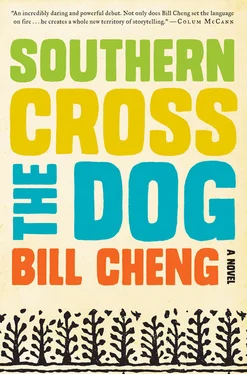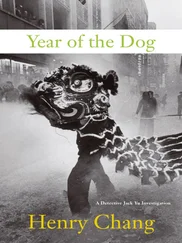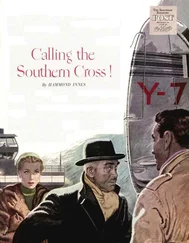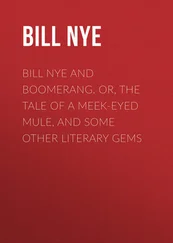We each of us were rough and awkward in our grief. Little Robert I worried over the most. Outwardly he wasn’t much changed, but inside, I saw storms. He didn’t cry, but to everyone and everything, he cast a dark eye. To me, his solitude became frightening. When he scraped his knee or was startled by lightning, he no longer came to us for comfort and protection. I suppose he had figured that we were not much good for it.
In those early weeks, you would not let him from your sight. You held on to him, would sleep with him tucked hard against your chest. It seemed to soothe you some, but the smallest reminder of his brother would send you into violent spasms of grief and bring a black cloud over all of us.
You cried every day — cursing God and me and your damned life. You tore your hair and beat the walls with your fists. Your rage was something larger than you could handle. It wore you out — leached the black from your hair, pressed hard cruel lines about your eyes and cheeks.
Then one day, it was over. You stopped crying. Stopped talking. Stopped doing much of anything. We were just shades.
Wasn’t long after that the Great Flood came. And though you saw those waters as judgment from on high, I could not find the same solace. Our family was broken, and I knew my part in its breaking.
SOMEHOW, WE SURVIVED, THE HIGH water and that bastard and his boat. On dry land they picked us up and trucked us from the flood ledge a half hour to Camp Mercy in Hollandale. Out the window were the stone-wracked road, the chain-linked gate, three and one-half acres of parkland, rowed with pup tents. The sky was a gray slate and the pines shimmered with wet. There were a dozen of us crowded together in the back of the truck, too spent to move. The rain was coming through the torn canvas, and we sat inch-deep in the water.
The truck took us to a brick house, where a line of refugees stretched out through the door. One by one, we climbed out and were given oilskin ponchos and made to get in line. You wouldn’t let me near you with the slicker. You turned away, protesting. In the end, I draped it around you as best I could, like a cape, and me, you, and Robert stood there in the rain.
When it came our turn, we put our names to a long list, and men came to separate us out. The boy was put with me, while two attendants tried to guide you into another room. They only wanted to help, Etta. But you saw they were coming and you seized up, let out a wail, and grabbed at our child. They tried to force down your arms but you wouldn’t let go, clutching at him for dear life.
Finally the man in charge waved the attendants away and let Robert stay with you. I went into a separate room, where a man went through my hair with a comb and tweezers. They read my pulse and had me swallow a vitamin pill. I was led down into a basement, where I could change into a gusset shirt and pants. You and the boy came down soon after. We were given a ration card and a box of supplies and were shown on a map where to find our tent.
We hiked through the drizzle, across the parkland, going up and down the rows. The other survivors watched us from within their pup tents, their faces tense and silent. We found our shelter, at the edge of the camp, where the stink of the latrines was made worse from the rains. When we arrived, there was a man inside, asleep on the canvas flooring. His clothes were full of patches, and the tops of his shoes had been torn off.
The man startled when he heard us.
Sorry, he said. He stood up, excused himself, and walked out into the rain.
I unpacked the box: a change of clothes, three pairs of trousers and two shirts, not a one of them sized right. Underneath the clothes were two sleeping bags, a comb, two toothbrushes, and a pack of cigarettes.
We slept huddled, the rain pattering the canvas around us, the dead weight of our bodies on top of each other. I woke several times through the night, too empty to move, and I saw the raw morning spill through a tear in the canvas, the sky mud yellow, clanking with rain, like the first dawn on the ancient Earth. We woke rested but hungry, and when the ration truck came down our row, I fought my way through the mob for a parcel of powdered milk, rock hominy, two pounds of hash, and a bar of soap.
The days turned to weeks, and those ragged half-drowned souls would pour into Mercy stinking of mold and rot and dysentery, their bodies rain-beat and shiftless. Mosquitoes ranged the camp, hunting blood as we fought and clamored for the short supply of netting. At all hours, men who could no longer stand were carted in wagons to the medical tents. They were pale and feverous, their skin spotted with carbuncles.
Rumors spread that the deathly sick were doped with morphine, then trucked out to the river and thrown in. And still every day more refugees were trucked in, each more desperate than the last. When they ran out of housing, the refugees were placed in cots inside offices. Soon they cut our rations to a parcel every two weeks and men were driven to thieving. At night I slept with an iron spike under my shirt.
It didn’t take long for the troubles in Mercy to call down the greedy and opportunistic. Pimps, pitchmen, and Bible-thumpers beset Mercy’s borders. At dusk you could see the painted women slip into the pup tents, and at dawn the snake-oil men would square their territories on the avenues and yodel into the crowds. They were a circus for the sick and desperate, filching what little we had managed to salvage of our former lives.
Because I was among the able-bodied, I joined one of the labor crews.
The work took me away from the camp, away from you and Robert, but it earned us an extra parcel come delivery day. Five days a week, I’d take the work truck out of Mercy through Hollandale to the flood shelf. There, with a few dozen men, I’d sift through the wrecked towns. Homes that hadn’t been destroyed in the flood had been gutted and looted. In the streets, the smell was unbearable. Waterlogged bodies floated in the knee-deep water, the flesh coming apart like rotten fruit. We worked for hours with no protection from the biting flies that trailed the corpses.
It was a hell but still I went. I told myself we needed food. Supplies. My travel pass let me come and go out of Camp Mercy, into Hollandale, where I could try to barter for better food, blankets, medicine. But truth was — forgive me — a part of me was glad to get out every morning, away from you. You got worse as the days went on, and I would not let on how bad it got. You muttered to yourself and barked like a dog. Didn’t dress nor bathe no more, and there were times I felt so frail that I could not carry another burden.
It fell to Robert to tend to his mama, and he did so without complaint. He bathed you, changed and washed your clothes. Little Robert helped in a way no child should ever have to.
Then one day, when I had come home early, and I found you inside the tent, my Etta, a strange look across your face. I came closer and the smell overtook me. You were not embarrassed or angry or sad. Just frowned a little. Robert wasted no time. He held your arms straight up. Before I understood what was happening, he’d lifted the dress over his mama’s head. A hard sour grief overtook me. I saw my Etta, my sweet Etta — body, mind, and soul lay in ruins. A woman older than her years. Her body covered in sores, folds of skin hanging from her belly from where she’d wasted. Little Robert kept his eyes to the floor, tried not to look at his mama, her large sagging breasts. I could tell he had done this many times before. He fetched a wet rag and wiped you clean. Then he rubbed salve on the insect bites that covered your thighs.
God forgive me.
In the next three days, I managed to scrounge up fifty dollars. I made arrangements with a woman named Lucinda Quinn, the owner of a cathouse who had been scouting for promising girls out of Mercy and into her employ. She looked at me queer when I offered our boy up for an apprenticeship. He was well behaved, I told her, and good at house duties. He cleaned and swept and did the wash in the camp and did not eat much. She had no call for boys in her trade, she told me, but after she’d seen the sorry state of the boy’s parents, she relented and took my money. I woke Little Robert at midnight, prying him from your sleeping hold. I dressed him quick and took him out across the camp where the wagon would be waiting. He was still groggy, eyes half shut, moaning.
Читать дальше












